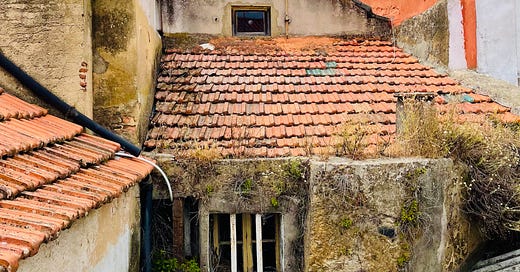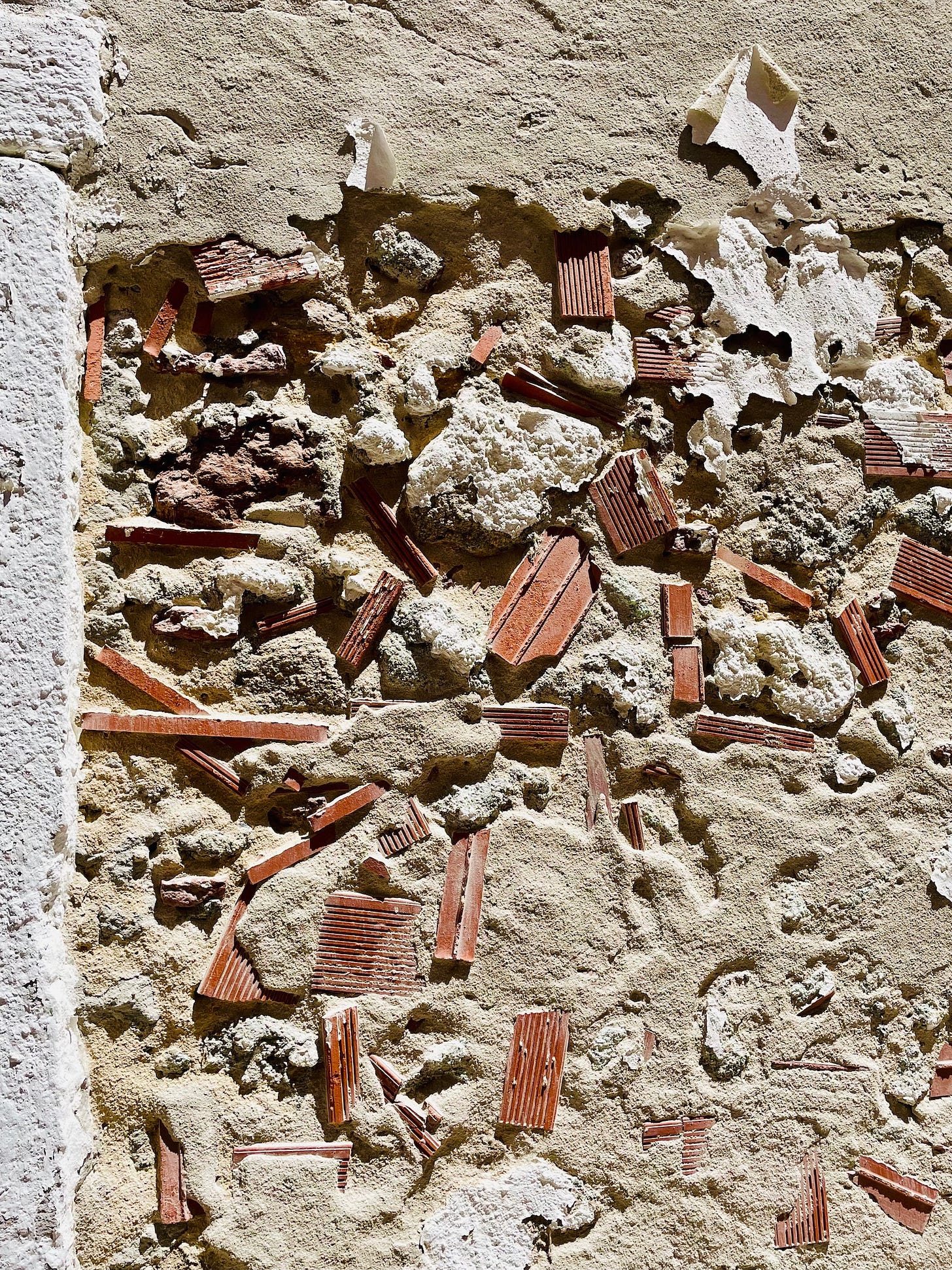life: examined is an invitation to get curious—a collection of ideas, and thoughts about living a creative, intentional life—written from my perch in Portugal.
—> Thank you for your support
Something happened to spring.
It was here for a few weeks on the heels of winter, then last week, mid-summer barged in, blowing her hot air and sunshine all over the place. How rude. But wow, we’ve had glorious weather in Setúbal—that is, once the heatwave subsided.
Although not a Mediterranean country, contrary to geographically-challenged claims, when the heat hits, we in Portugal behave like the people in southern-most countries—we hibernate during the hottest parts of the day.
Middle-of-the-day breaks are best for napping, snacking, writing, listening to podcasts, and reading. I’m an avid fan of all those pursuits.
Traditionally, Portuguese buildings are constructed to keep the heat out and the cool, as it is, in. In my new place…hold on, let me measure…some of the walls are nearly two feet thick!
To state the obvious: residential construction methods in Portugal are vastly different from how houses are built in the U.S.
HVAC What?
My apartment, like the majority of housing in Portugal (unless it’s considerably newer and/or built for foreigners or those with deeper pockets), is without central heating or air conditioning.
Energy poverty is a problem; areas with fewer resources, older, run-down buildings, and an aging population are subject to the worst disparities.
Heat waves and cold snaps can be deadly, especially for seniors.
It takes time and sharp senses, plus a heap of trial and error, to find housing in Portugal that isn’t too cold, hot, damp, or lacking in natural light.
Although I sacrifice some natural light in my new apartment compared to the previous one, the benefits of my new abode otherwise make it worth it (ask me in February).
Most of us get by with electric heaters and fans.
Some people use portable air conditioners, and some have split unit systems installed (heat pumps). These units, mounted above interior doorways, are relatively small and generally energy-efficient.
In my former apartment, I had the luxury of heat and a/c via split units in each room, but not in the new place.
My new place is pre-wired for such installation, but I‘m doing everything I can to resist the urge to install this modern convenience.
First, I want to live through the seasons with minimal intervention—other than wearing layers when it’s cold or soaking in a kiddie pool on my patio when it’s blazing hot.
To discover what my little house feels like before making big financial expenditures and even bigger holes in my walls seems prudent.
I’m hopeful that casa pequena will stay relatively cool in summer but not super cold in the winter; however, I’m likely delusional.
With climate catastrophe making an impressive showing of rising temperatures, melting glaciers, rising sea levels, and displacement/extinction of animals and humans, I want to contribute as little as I can to this predicament.
I know my minuscule actions won’t fix this, the biggest problem of our lifetimes.
Clearly, these global crises are not terrifying enough to mobilize most governments and populations to make the mandatory changes we need to make—now.
To maintain my integrity and some semblance of peace, I need to look in the mirror and know that I’m living my convictions, not just talking or writing about them.
May that be the reflection I see.
Throw dagger eyes at me if you must, but we can’t all use air conditioning if the planet is to survive this current onslaught.
I realize there are people with compromised health and other issues that make air conditioning essential (and we are all pending members of this group).
Still, there are ways that people in relatively good health could minimize the use of a/c, thereby making the planet more comfortable for all its inhabitants.
An MIT Technology Review article by James Temple that was published in 2020 asserts:
Air conditioning technology is the great missed opportunity in the fight against climate change: Soaring AC demand will threaten our power grids and accelerate global warming – unless we begin making significant changes soon.
Now, two years after that article was published, the imperative to make changes is upon us—and we are out of procrastination time.
Doing our Best (and a Challenge)
Over the past few years (decades?), the world has become increasingly complex and challenging.
Some of us are just surviving as we find our way through the haze of modern life with wars or would-be wars on our doorstep, climate catastrophe, new viruses, and the reign of megalomaniac narcissistic authoritarians. It’s a lot, and it’s too much.
Checking out can be survival—or it can be just lazy disengagement.
I know we are all doing the best we can each day, and I also know that many of us are often on auto-pilot, giving little thought to the things we do each day, just doing them because it’s what we do.
I also know this: my readers are exceptional; we’re all life examiners, at least sometimes.
Here’s a challenge for this week:
Let’s be a bit more curious. Would you be willing to question your daily habits and beliefs around what you think you need to function or be happy?
On closer examination, are there some patterns you would change—or would you keep everything as is?
Is the prospect of scrutinizing why you do what you do a terrifying one?
Perhaps I’m hopeful, but what if everyone reading this committed to making one tiny change? How cool would that be?! We are a mighty crew of a few thousand life examiners—let’s give it a try!
I’d love to hear how this goes if you decide to join me in this challenge. Leave your feedback in the comments section below.
JUST ONE GOOD LINK!
—> take a deep breath then read the following sentence out loud (Grammarly tells me “a knowledgable audience may find this hard to read…”):
SO, What do #vanlife, the romanticized, faux-agrarian, overwhelmingly white #cottagecore trend (feudalism and barely-subsistence farming was fun!), the use of science to manipulate and promote the deeply internalized and destructive cult of self-improvement to “become your best version” B.S., and capitalist progress have to do with one another?
Throw in the “fake futurism of Elon Musk,” and you’ve got one brilliant video dissecting and linking these topics —> the anti-tech movement is back by Alice Capelle.
—> And yes, she cites her sources.
Nb: If you’re attracted to these trends (van life, yep, I was), it’s not your fault!
But, if we don’t dig deeper to discover what’s going on with these messages, especially the images that seem so okay, normal, and desirable, then we unwittingly become part of the problem.
If you watch this video, I’d love to know what resonated (or not) with you!
FAVORITE PORTUGUESE TO ENGLISH TRANSLATION OF THE WEEK:
In ribbed sweating solid wood, a style of its own and infinitely practical... it's a very special accomplice!
Umm, okay, then. :)
Thank you Ari & Eloise, FI, and Philippa & Neil, Alex, and Deb for supporting life: examined through Buy Me a Coffee. Your generosity, in part, affords me time to write this letter to you each week(ish).
Whether a coffee, a comment, a like, or a share—I’m grateful to have you along for the ride.
Until next time —> stay curious, wear sunscreen, and thank you for reading life: examined







Almost scary but then I remembered- dah, Twins! I was reading last night about how tech is not the problem per se, it’s how it is used. The US/UK model of putting the responsibility on the individual is at odds with what needs to happen to create change, and that is people joining forces and banding together just like the history-changers before. While ‘doing our bit’ is a way for us to feel less hopeless about a dire situation, change will only come about when it is demanded by a united majority. I’m sure that policies and movements are created to keep people as individuals and not groups - just look at a modern US/UK housing development where there is no place at all for people to come together except a Starbucks at the mall.
We can all do our bit to save energy.